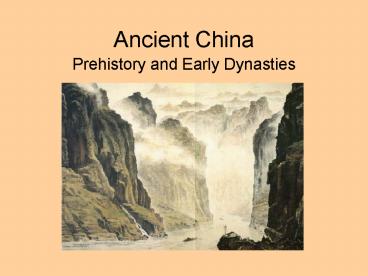Ancient China - PowerPoint PPT Presentation
1 / 19
Title:
Ancient China
Description:
'Chinese' civilization developed around two main rivers: the Yellow (Huang He) ... he was given to drinking, women, festive orgies, and 'songs with crude lyrics. ... – PowerPoint PPT presentation
Number of Views:60
Avg rating:3.0/5.0
Title: Ancient China
1
Ancient China
- Prehistory and Early Dynasties
2
Geography of East Asia
Gobi Desert
Central Asia
Himalaya Mtns.
3
Neolithic China
- Chinese civilization developed around two main
rivers the Yellow (Huang He) and Yangtze. - Around 7000 B.C.E.
- Cultivation of agriculture led to the development
of urban areas. - Yangshao and Longshan cultures.
- Development of dynasties.
4
(No Transcript)
5
Early Dynasties
- Xia Dynasty (c. 2070 c. 1600 B.C.E.)
- Not much known, mostly legend verified by some
archaeological findings. - Records of the Grand Historian (109 91 B.C.E.)
by Sima Qian. - Early writing found on bones and shells.
- Shang Dynasty (1600 1046 B.C.E.)
- Chinese culture as we discussed earlier begins to
develop during this period. - History pieced together from oracle bones.
- What is an oracle bone?
6
Oracle bones from the Shang period.
7
Anyang .
8
Politics and Society of Shang
- Primarily agricultural society ruled by a king
and aristocratic class. - King (? wang) was an intermediary between
heaven and earth. - Religious system revolved around gods in early
Shang period. - Human sacrifice evolves into ancestor veneration
by end of Shang Dynasty. - Emergence of idea of Mandate of Heaven (??)
- Differentiation of classes aristocrats,
peasants, and slaves. - Writing system disseminates throughout East Asia.
9
Last Shang King
- King Di Xin (aka Zhou Wang ??).
- Added territory to Shang empire.
- According to Sima Qian, he was given to drinking,
women, festive orgies, and songs with crude
lyrics. - Ignored affairs of state.
- Fall of Shang Dynasty, 1046 B.C.E.
10
Zhou Dynasty
- Zhou Dynasty (1045 256 B.C.E.), named after the
Zhou province, emerged in western Yellow River as
a principality of the Shang Dynasty. - Founded by Ji Chang, son Ji Fa (aka King Wu)
first Zhou emperor claimed Mandate of Heaven. - Battle of Muye (1046 B.C.E.), Zhou army attacks
Shang capital Di Xin sets his own palace on fire
and is burned alive. - Dynasty divided into Western Zhou and Eastern
Zhou dynasties.
11
(No Transcript)
12
(No Transcript)
13
Zhou Politics
- Zhou Dynasty becomes feudal Fengjian system.
- Decentralized rule, emperor appoints lords and
vassals as territorial governors. - Eventually results in instability.
- Mandate of Heaven elaborated on.
- Not only justifies rule, but also overthrow.
- He who wins is the king he who loses is the
rebel. - Permanent rule of statecraft.
14
Zhou Economy
- Feudal economy and land divisions well field
system from Chinese character for well, jing
(?) slavery decreased. - Development of an artisinal and merchant class in
the walled towns and villages. - Improvements in agriculture improved crop
yields rise in population. - Silk trade begins with ancient Mediterranean and
Middle East cultures. - Barter system transitions into money system.
15
Cosmological Beliefs
- Anthropomorphic god Shang Di evolves into Heaven
(tian, ?). - Yang and Yin harmony/balance.
- The Dao (?, Way) ethical way of living, similar
to Dharma. - Competing schools of philosophy
- Confucianism more philosophy than religion.
- Daoism more religion than philosophy.
16
Confucianism
- How did Confucius (Kung Fuci) explain Dao?
- First, duty to family and community.
- Second, human-heartedness compassion or empathy
for others. - Third, deemphasize gods, death, and the afterlife.
17
Daoism
- Founded by Laozi (4th c. B.C.E.), contemporary of
Confucius. - Similar to Confucianism, except
- Inaction over action.
- Let nature take its course.
- Stress on deities and spirits.
18
Daoist landscape painting. What do you notice
about this artwork?
19
(No Transcript)































